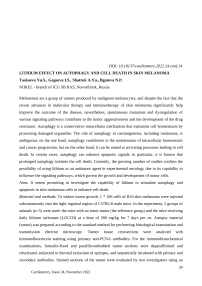Lithium effect on autophagy and cell death in skin melanoma
Автор: Taskaeva Yu.S., Gogaeva I.S., Shatruk A.Yu., Bgatova N.P.
Журнал: Cardiometry @cardiometry
Статья в выпуске: 24, 2022 года.
Бесплатный доступ
Melanomas are a group of tumors produced by malignant melanocytes, and despite the fact that the recent advances in molecular therapy and immunotherapy of skin melanoma significantly help improve the outcome of the disease, nevertheless, spontaneous mutations and dysregulation of various signaling pathways contribute to the tumor aggressiveness and the development of the drug resistance. Autophagy is a conservative intracellular mechanism that maintains cell homeostasis by processing damaged organelles. The role of autophagy in carcinogenesis, including melanoma, is ambiguous: on the one hand, autophagy contributes to the maintenance of intracellular homeostasis and cancer progression, but on the other hand, it can be aimed at activating processes leading to cell death. In certain cases, autophagy can enhance apoptotic signals, in particular, it is known that prolonged autophagy initiates the cell death. Currently, the growing number of studies confirm the possibility of using lithium as an antitumor agent in experimental oncology due to its capability to influence the signaling pathways, which govern the growth and development of tumor cells. Aims. It seems promising to investigate the capability of lithium to stimulate autophagy and apoptosis in skin melanoma cells to enhance cell death.
Короткий адрес: https://sciup.org/148326306
IDR: 148326306 | DOI: 10.18137/cardiometry.2022.24.conf.14
Текст статьи Lithium effect on autophagy and cell death in skin melanoma
LITHIUM EFFECT ON AUTOPHAGY AND CELL DEATH IN SKIN MELANOMA Taskaeva Yu.S., Gogaeva I.S., Shatruk A.Yu., Bgatova N.P.
NIIKEL - branch of ICG SB RAS, Novosibirsk, Russia
Melanomas are a group of tumors produced by malignant melanocytes, and despite the fact that the recent advances in molecular therapy and immunotherapy of skin melanoma significantly help improve the outcome of the disease, nevertheless, spontaneous mutations and dysregulation of various signaling pathways contribute to the tumor aggressiveness and the development of the drug resistance. Autophagy is a conservative intracellular mechanism that maintains cell homeostasis by processing damaged organelles. The role of autophagy in carcinogenesis, including melanoma, is ambiguous: on the one hand, autophagy contributes to the maintenance of intracellular homeostasis and cancer progression, but on the other hand, it can be aimed at activating processes leading to cell death. In certain cases, autophagy can enhance apoptotic signals, in particular, it is known that prolonged autophagy initiates the cell death. Currently, the growing number of studies confirm the possibility of using lithium as an antitumor agent in experimental oncology due to its capability to influence the signaling pathways, which govern the growth and development of tumor cells.
Aims . It seems promising to investigate the capability of lithium to stimulate autophagy and apoptosis in skin melanoma cells to enhance cell death.
Material and methods . To induce tumor growth, 1 * 106 cells of B16 skin melanoma were injected subcutaneously into the right inguinal region of C57BL/6 male mice. In the experiment, 2 groups of animals (n=5) were used: the mice with an intact tumor (the reference group) and the mice receiving daily lithium carbonate (Li2CO3) at a dose of 300 mg/kg for 7 days per os . Autopsy material (tumor) was prepared according to the standard method for performing histological examination and transmission electron microscopy. Tumor tissue cryosections were analyzed with immunofluorescent staining using primary anti-PCNA antibodies. For the immunohistochemical examinations, formalin-fixed and paraffin-embedded tumor sections were deparaffinized and rehydrated, subjected to thermal extraction of epitopes, and sequentially incubated with primary and secondary antibodies. Stained sections of the tumor were evaluated by two investigators using an
Conference Proceedings immunoreactive score. Weighted scores for expression of LC3 beta, LAMP1, Bcl-2, Bad, and caspase 3 were calculated using the formula as follows: degree x intensity of staining. Differences were assessed using nonparametric Mann–Whitney tests with the Statistica 6.0 statistical software. Results. When evaluating the expression of the proliferation marker protein PCNA, a significant decrease in the number of proliferating cells in the tumor was shown. Lithium considerably increased the formation of autophagic vacuoles and the expression of autophagy markers LC3 beta and LAMP1 in the tumor cells. In sections stained with hematoxylin-eosin in the group of mice, who received lithium, multiple focal areas of cells with the eosinophilic cytoplasm, swollen nuclei and karyorrhexis were detected that were markers of the necrotic changes. Quantification of the identified areas of necrosis showed that lithium enhanced the necrotic death of the cancer cells in vivo. Lithium also increased the expression of proapoptotic proteins, but however no decrease in the Bcl-2 expression was observed. The Bad/Bcl-2 ratio for the reference group was recorded to be 0.77, and for the group receiving lithium, it was reported to be 1.
Conclusion . Thus, lithium carbonate, the conventional drug for the treatment of bipolar disorders, is a compound that inhibits proliferation and induces death of the melanoma cells via the induction of autophagy, necrosis, and apoptosis, likely associated with caspase activation. The obtained evidence data allow achieving a better understanding of the mechanisms of cell death of the melanoma cells with the introduction of lithium. Considering the accumulated experience of research in the use of lithium in cancer, as well as taking into account the fact that patients treated with lithium demonstrate a lower incidence rate of melanoma, further research on the therapeutic potential of lithium in cancer is required. The proper understanding of the precise mechanisms of the action of lithium may be useful for further development of combined chemotherapy regimens to address some specific intracellular signaling pathways and improve the anticancer treatment in melanoma.


